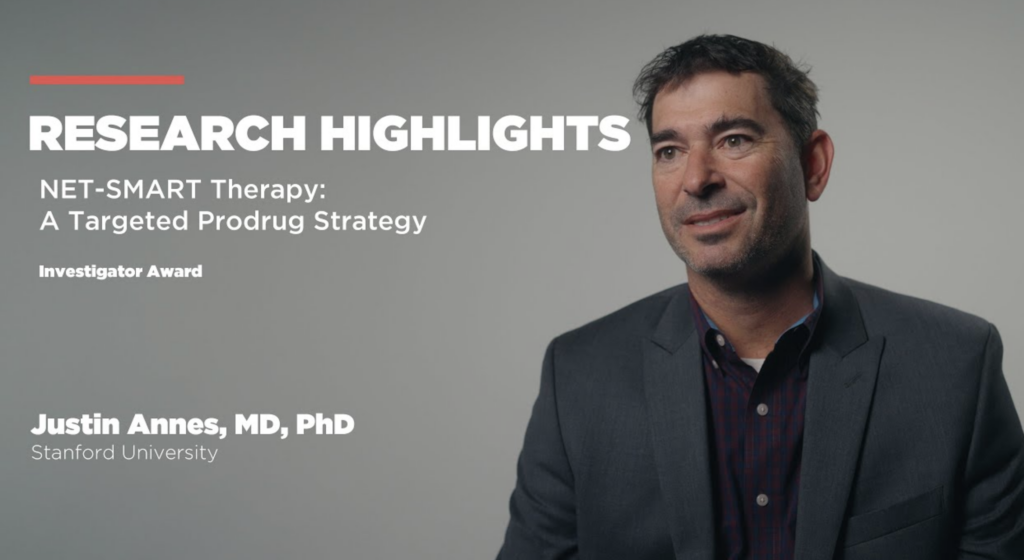Project title: NET-SMART Therapy: A Targeted Prodrug Strategy (II)
Justin Annes, MD, PhD Stanford University

- Status: Completed
- Year(s): 2021
- Grant Type: Investigator
- Research Type: Basic, Translational
- Primary Tumor Site: Multiple
- Article/Video: Click Here
- Also seen in July 2020 eUpdate
Description
Annes and his team will work to validate well-tolerated chemotherapeutic drugs that are selectively activated by and toxic toward NETs. This NET-Smart strategy is a pioneering platform technology applicable to numerous chemotherapeutics that may ultimately transform the treatment of NETs.
What question will the researchers try to answer?
Although medications are available that can eradicate any and all cancer cells in a dish, these same medications are only partially effective in people. The main reason for this discrepancy is that the amount and duration of chemotherapy treatment needed to kill all the cancer cells is too toxic toward healthy cells. In other words, the problem with these treatments is not that they couldn’t work; the problem is that doctors don’t have a way to specifically target the cancer cells. This challenge is particularly acute for the treatment for neuroendocrine cancers, which generally grow slower than several normal tissues such as the blood system and gastrointestinal tract. The use of highly effective cell-killing chemotherapeutic treatments, which depend upon cellular growth to work, is therefore prevented by hematologic and gastrointestinal side-effects. In this project, Dr. Annes and his team are asking whether it is possible to modify highly toxic chemotherapies so that they selectively target neuroendocrine cancer cells.
Why is this important?
Patients are in need a curative treatment for neuroendocrine cancer!
What will researchers do?
In their preliminary work, which was conducted with support of NETRF, Dr. Annes and his team devised a strategy to selectively target highly toxic drugs specifically to neuroendocrine cancer cells. In this project, they will build upon their initial success to improve the medications they have developed and to test whether they work in mouse models of neuroendocrine cancers.
How might this improve the treatment of NETs?
The goal of this project is to develop cytotoxic medications that are well-tolerated (little to no side effects) so they can be used at sufficient doses to cure neuroendocrine cancers.
What is the next step?
Dr. Annes and his team aim to improve upon the drugs they have developed and prove that they work in mice with neuroendocrine cancers. Their goal is to show that our drugs can kill the tumors in mice without causing side effects. If this works, the research team will then develop additional preclinical safety data and prepare to test their medications in people. Because they are starting with medications that are already used in humans, the team anticipates that their road to human trials will be accelerated.
Outcomes:
Click below to watch an update from Dr. Annes:

Neuroendocrine tumors (NETs) are frequently inexorably progressive once metastatic, in part, because of the ineffectiveness and life-threatening toxicity of available chemotherapeutics. To overcome this challenge, we devised a new paradigm for NET-targeted chemotherapeutic delivery that leverages the unique biologic properties of these tumors. In preliminary studies, we demonstrated the feasibility of our approach by generating chemotherapeutic pro-drugs (NET-Smart compounds) that are selectively cytotoxic towards numerous NET-derived cell lines. The focus of this proposal is to perform pre-clinical validation in mouse NET models. These proof-of-concept studies are being performed with our lead NET-Smart compounds. During this second reporting period, we made important progress towards this goal. We performed large-scale chemical synthesis of our novel NET-Smart compounds for extensive in vitro and in vivo testing of these drugs. Next, we developed in vivo dosing strategies that allowed us to test the efficacy of our lead NET-Smart compound. Next, we began testing our lead NET-Smart compound in two different mouse NET models. Although our results are in the preliminary phase, initial findings suggest that our lead NET-Smart compound demonstrates selective cytotoxicity towards NETs compared to non-NETs. This is in contrast to our control chemotherapeutic treatment (Irinotecan), which exhibits non-selective cytotoxicity. Furthermore, we examined whether our NET-Smart treatment has off-target effects on the intestine. These experiments are at an early stage, and conclusions cannot be drawn. This work is critical for setting the stage for validating our pioneering platform technology which has the potential to transform neuroendocrine cancer treatment.
Additional Details
- City: Stanford
- State: California
- Country: USA
- Grant Duration: 2 years
DISCLAIMER
NETRF funds laboratory research to understand the development of neuroendocrine tumors and translational research to explore new concepts in treatment. Research grant descriptions and research updates from NETRF are not intended to serve as medical advice. It can take years for research discoveries to be fully validated and approved for patient care. Always consult your health care providers about your treatment options.



